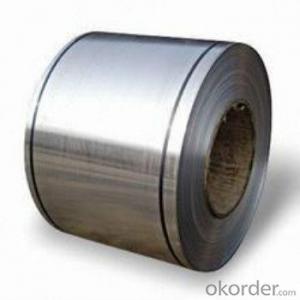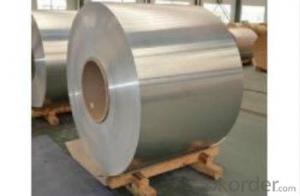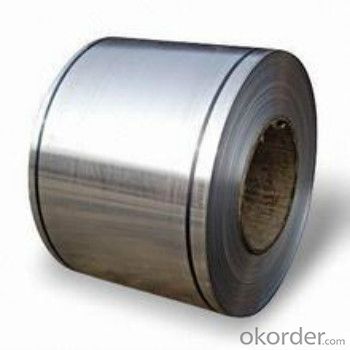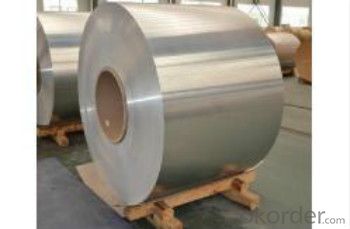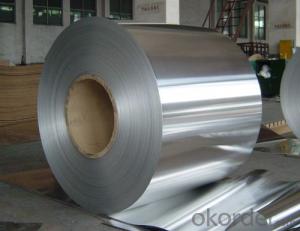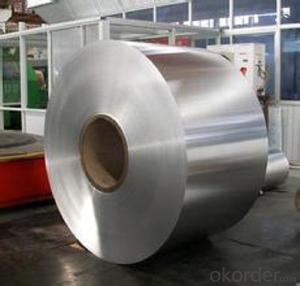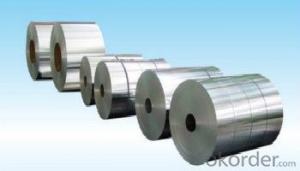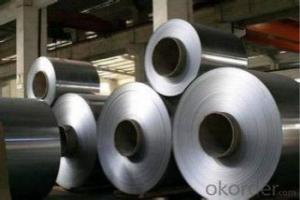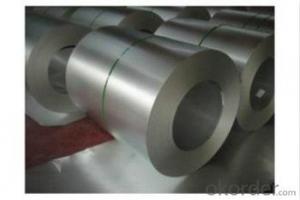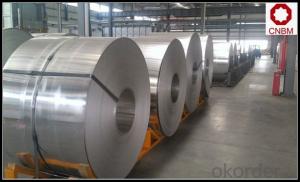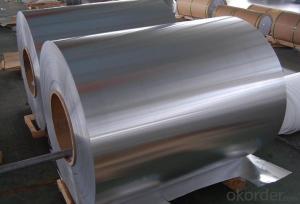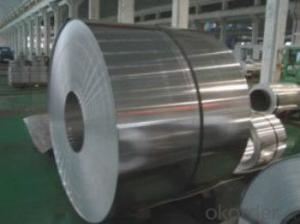3003 Aluminum Coil Price - Mill Finished Aluminum Coil AA1050 Temper H24
- Loading Port:
- Shanghai
- Payment Terms:
- TT OR LC
- Min Order Qty:
- 5 m.t.
- Supply Capability:
- 4000 m.t./month
OKorder Service Pledge
OKorder Financial Service
You Might Also Like
Specification
1. Aluminum Coil Description:
Aluminum coil, is a rolled product, produced in a coiled form of continuous strip, and having an ID (Inner diameter) and OD (Outer diameter).Common alloy coil are used for a wide variety of applications, alloy 1050, 1060, 3003, 3105, 3005, 5052, 5754, 5083, 6061, 8011, 8021, and so on, in thickness from 0.0065-7mm, in width from 300- 2200mm.
2.Main Features of the Aluminum Coil:
• Great ductility
• Heat conductivity
• Anti-corrosion
• Moisture resistanve
3.Aluminum Coil Images
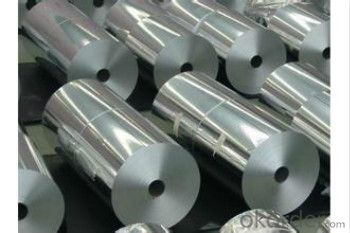
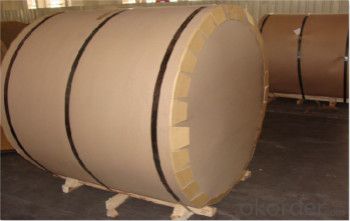
4.Aluminum Coil Specification
Aluminum Coil/Sheet | |
Main Specification | |
Alloy | AA1xxx (AA1050, AA1060, AA1070, AA1100 etc.) |
AA3xxx (AA3003, AA3004, AA3005, AA3105 etc.) | |
AA5xxx, AA6XXX (AA5052,AA5083, AA5754, AA6061, AA6062 etc.) | |
AA8xxx(AA8011, AA8006, AA8079 etc.) | |
Temper | H14,H16, H18, H22, H24, H26, H32,O/F |
Thickmess | ≥0.2mm |
Width | 30mm-2100mm |
Standard | GB/T 3880-2006 |
Special specification is available on customer's requirement | |
5.FAQ
We have organized several common questions for our clients,may help you sincerely:
(1) How to guarantee the quality of the products?
We have established the international advanced quality management system, every link from raw material to final product. we have strict quality test; we resolutely put an end to unqualified products flowing into the market. At the same time, we will provide necessary follow-up service assurance.
(2) MOQ?
For trail order, we accept 5 MT.
(3) Payment term?
30% deposit, balance against the BL copy; 100% L/C at sight
(4) What is the delivery time?
Depends on actual order, around 30 to 35 days
- Q: It's time for a new bike and I don't know enough about the pros and cons of aluminum vs. carbon fiber. I can get a low-end carbon bike or a high-end aluminum for about the same price, so the budget is not really a major issue. Any opinions would be appreciated.
- carbon is normally lighter but i would prefer the high end aluminum
- Q: In my line of work I see aluminum ground lugs, bonding nuts and straps and also neutral bars eat copper up, especially when exposed to the elements. I know how galvanic reaction works between elements under current load, but my question is why do aluminum and copper seem to hate each other more than any other? And, why would they still be required in usage together per NEC code?
- This problem arises between various metals such as iron aluminium where some form of plastic barrier is needed to stop electrochemical reaction taking place where these metals are in long term contact with each other especially in a wet environment. As far as aluminium copper are concerned, the difference in their chemical reactivity is particularly large; aluminium is a highly reactive metal that quickly becomes dull by coating itself with a very thin layer of aluminium oxide whilst copper is one of the least reactive of all metals. However, once covered with a fine layer of aluminium oxide, aluminium will tend not to corrode further. The effect of this is that any copper that does go into solution as a result of contact with weak atmospheric acids will very readily precipitate again as metallic copper onto the aluminium. Reactions similar to those below will readily take place: H2O (rain) + CO2 --- H2CO3 (carbonic acid - carbon dioxide dissolved in rain water) Cu + H2CO3 --- CuCO3 + H2 In an aqueous environment, 3 CuCO3 + 2 Al --- Al2(CO3)3 + 3 Cu Copper aluminium are regularly used because they are relatively low cost when compared with potential alternatives, even with recent commodity price increases. Toughened plastic has replaced copper in certain plumbing applications which have obviously eliminated this galvanic reaction problem.
- Q: I own a pistol with an aluminum frame. If I were to store it away for a long time, would I need to bother wiping oil over the aluminum surfaces in addition to the steel surfaces? If it helps, there is a dark grey sort of finish on the aluminum.
- no aluminum does not rust anything steel you should probably oil
- Q: Can aluminum coils be used for architectural facades?
- Yes, aluminum coils can be used for architectural facades. Aluminum is a popular material for architectural applications due to its lightweight nature, durability, and flexibility. It can be easily molded and shaped into various forms, making it suitable for creating unique and aesthetically pleasing facades. Additionally, aluminum is resistant to corrosion, making it a long-lasting choice for exterior applications.
- Q: Can aluminum coils be used in chemical processing plants?
- Yes, aluminum coils can be used in chemical processing plants. Aluminum is resistant to many chemicals, especially in non-acidic environments. It is lightweight, has good thermal conductivity, and can withstand high temperatures, making it suitable for various applications in chemical processing plants.
- Q: How many companies have used aluminum coil?
- Too many. All the companies who make the aluminum products you have seen in daily life have used it. So it is hard to explain.
- Q: How are aluminum coils used in the production of power transmission lines?
- Aluminum coils are used extensively in the production of power transmission lines due to their unique properties and benefits. These coils are typically made from high-quality aluminum alloys that offer excellent conductivity, strength, and corrosion resistance. One key application of aluminum coils in power transmission lines is in the manufacturing of overhead conductors. These conductors are used to transmit electrical energy from power plants to substations and distribution networks. Aluminum coils are used to create the conductive core of these overhead conductors, as aluminum has a much lower resistance compared to other metals like copper. This low resistance allows for efficient transmission of electricity over long distances, minimizing energy loss and improving overall system performance. Moreover, aluminum coils are lightweight compared to copper coils, making them easier to handle and install. This characteristic significantly reduces the costs associated with transportation, installation, and maintenance of power transmission lines. As a result, aluminum coils have become the preferred choice for overhead conductors in power transmission systems worldwide. Furthermore, the corrosion resistance of aluminum coils ensures long-term durability and reliability of power transmission lines. Aluminum naturally develops a protective oxide layer that prevents further corrosion, even in harsh environmental conditions. This corrosion resistance extends the lifespan of the transmission lines, reducing the need for frequent repairs or replacements. In summary, aluminum coils play a crucial role in the production of power transmission lines. They enable efficient electricity transmission over long distances, reduce costs associated with installation and maintenance, and provide long-lasting corrosion resistance. With these advantages, aluminum coils have become a widely adopted solution in the power industry to enhance the performance and reliability of power transmission systems.
- Q: I wrap everything with aluminum foil and bake it in the oven -- fish, meat, vegetables. Is this really safe? Or safe when done occasionally? Or should I find a new way?
- Perfectly safe to use aluminum foil in the oven..........NOT so much in the microwave, lol. :)
- Q: This question asks about the distinctions among various grades of aluminum coils, likely referring to their properties and uses.
- <p>Aluminum coils are differentiated by grades based on their alloy composition, thickness, and specific applications. Common grades include 1000 series (99% pure aluminum, soft and malleable), 3000 series (aluminum-manganese alloys, good for cooking utensils), 5000 series (aluminum-magnesium alloys, used in marine applications), and 6000 series (aluminum-magnesium-silicate alloys, known for strength and used in construction). Each grade has distinct properties such as strength, formability, and corrosion resistance, which determine their suitability for different industries and applications.</p>
- Q: Explain the distinctions between aluminum coil and aluminum foil, highlighting their physical properties and applications.
- <p>Aluminum coil and aluminum foil are both made from aluminum but differ in thickness and applications. Aluminum coil is a flexible and continuous roll of aluminum, typically thicker and stronger than foil, used in manufacturing processes such as construction, packaging, and automotive parts. It can be easily cut and shaped. Aluminum foil, on the other hand, is a very thin and lightweight material, often used for food packaging, cooking, and insulation due to its excellent barrier properties against air, moisture, and light. It's less durable than coil and is not typically used in structural applications.</p>
Send your message to us
3003 Aluminum Coil Price - Mill Finished Aluminum Coil AA1050 Temper H24
- Loading Port:
- Shanghai
- Payment Terms:
- TT OR LC
- Min Order Qty:
- 5 m.t.
- Supply Capability:
- 4000 m.t./month
OKorder Service Pledge
OKorder Financial Service
Similar products
Hot products
Hot Searches
Related keywords
